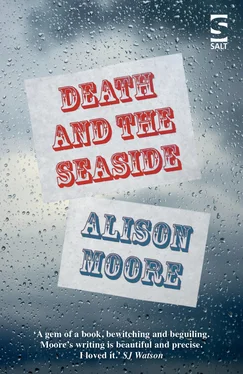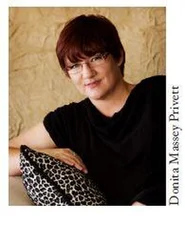Light was leaking into the sky. The tide would be coming in.
It seemed to her that it mattered greatly whether the word had somehow appeared within the glass or whether it had been scratched into the glass from the far side. She reached around, trying to touch the outside of the window, but her arm was too short. She got herself up onto the windowsill and tried again, straining towards that hard-to-reach spot behind the word. Her fingertips, with their bitten nails, edged closer. ‘Come on,’ she murmured, ‘come on,’ and she leaned out just a little further.
Her cigarette landed last, and softly.
Keep passing the open windows.
— John Irving, The Hotel New Hampshire
She knew that was how it had to end. As soon as she had seen that word, which really did seem to be scratched into the pane of glass in the unfastened window, Bonnie had known suddenly and clearly what she had to do. Still in that place between sleeping and fully waking, she had turned away from the wide-open window and written the last part of her story out in longhand in the lamplight, without even sitting down at the desk, only leaning over the desktop to scribble onto the paper, giving herself a backache. She felt strongly, unequivocally, that it was the only possible conclusion, although she would want to check that reference to ‘Casting the Runes’, that Coleridge quotation.
So, she thought, as she put down her pen, her story was finished, although she still did not know why the messages had appeared in Susan’s room, or who had put them there. It was the landlady, she supposed; she had wanted to see what would happen. People did some very odd things. Or at least the landlady was responsible for the first message. Beyond that, perhaps it had just been Susan’s imagination. Or perhaps it was all in her imagination; perhaps she had dreamt the whole thing. Perhaps, at the end, she was sleepwalking.
Straightening up, Bonnie became aware that the door to her room was standing slightly open, creaking in the breeze. She stepped away from the desk and went towards the door. She looked outside, peering up and down the dark landing. ‘Sylvia?’ she said, but there was no reply. She stepped onto the landing.
The door adjacent to hers was ajar, and Bonnie hesitated only briefly before entering this neighbouring room. Even in the dim light of dawn, Bonnie could see that Sylvia was not in there, although she switched the light on anyway. Not only was Sylvia not in her bed but there was no bed; there was no furniture at all except for a table standing against the wall. Everything was bare: the walls and the gappy floorboards and the lightbulb hanging from the ceiling. Only Bonnie’s room had been given a fresh coat of paint, and decorated with a few rolls of end-of-line floral wallpaper and cut-to-size patterned carpet and a Cézanne that might have been printed off the Internet, the bed dressed with Susan’s yellow blanket.
The table, which was standing against the partition wall, was the one with folding legs from the under-stairs cupboard, and on it stood an open laptop. On the screen, Bonnie could see what she realised was her own room, as if the screen were a one-way window; she could see the bed in which she had just been sleeping, and the wide-open window from which Susan had fallen. A wire snaked out of the side of the laptop and up the wall, up to a finger-sized hole that had been drilled through the brickwork. It reminded her of artworks that she had seen that invited people to look through peepholes. The wire disappeared into the hole, and would come out, she guessed, on the far side, just where the clock that did not tell the time had been hung on the wall. If she were to stand in her own room in front of the clock, her face would appear on the screen of the laptop in Sylvia’s room.
Next to the laptop was a notepad whose handwritten entries said things such as ‘9.46pm awake’. Beside the notepad were a few old typewritten pages, stapled together in one corner. The pages included, saw Bonnie, browsing through, a list of names, split into three groups, in the first of which Bonnie saw her mother’s name, and, inserted in pencil, a reference to herself: ‘Bonnie Falls, 7 years old’. Her skin prickled as if chilled by a draught. There was also a more recent, word-processed document — something like a report, with citations. Flicking through the loose pages, she saw ‘Bonnie has failed’, ‘free will is an illusion’, ‘FAIL’ and ‘JUMP’, and something about chickens. Towards the back, she found what seemed to be a summary or critique of the dissertation that she had never written, and a newspaper clipping about Eliot Pierce and his plunge from the top of the three-storey car park in town. He had landed badly and had been in a coma, but he was all right, he was going to be all right, as far as Bonnie knew. On the last page, like a final thought, was a single handwritten paragraph: ‘Eliot Pierce was 18, only just on the brink of adulthood, and Bonnie Falls was still an infant. Might young people be more susceptible to subliminal messages than older people are? They are certainly more suggestible. A number of reports document the suggestibility of children, especially very young children, whose memories are malleable, their narratives changeable, conforming to the adults’ suggestions. It should be quite easy to test whether these very young children are also more susceptible to subliminal messages.’
There was a used coffee cup on the table, and an Anglepoise lamp, and an empty CD case with a handwritten label on the front saying ‘BONNIE SEASIDE’.
Underneath the table, Bonnie found her shoulder bag, inside which she located her lighter; and in Sylvia’s bag, Bonnie discovered her missing phone, along with the car keys, and a paper bag with something hard and round inside it, like a cartoon bomb, wrapped in layers of tissue paper and bubble wrap. Beneath these layers, she found a teapot, with ‘Seatown’ written on the side.
She could not see her suitcase. And where was Sylvia? She was not in the little bathroom that adjoined this would-be bedroom. Bonnie opened the other door next to the bathroom, which was not a cupboard but a kitchenette, with a lukewarm kettle on the side, and those plastic water containers that Sylvia had brought along, and a toaster, and a half-empty jar of instant coffee and a spoon, and a little stack of clean crockery and Tupperware tubs on a tray, and a window that had a view of the sea and was within sight of the Hook and Parrot, which was a few hundred metres down the road.
Bonnie returned to her own room. There was light in the sky now. She looked in the wardrobe and under the bed, where she found her suitcase, and when she opened it up she found it full of her damp and mouldering clothes. The clothes that she had travelled down in were in there too and had become equally damp, but she put them on. She felt like something that had just crawled out of the sea.
There was still some life in her phone, and there was a signal. She had lots of missed calls, from home, from her mother, who Bonnie called now. She hoped that she would not hear the answerphone — ‘Please, please, please,’ she said to the phone — and then she heard her mother’s voice, saying, ‘Bonnie? Bonnie? Is that you? Where are you?’
‘I’m still at the seaside,’ said Bonnie, ‘but I’m coming home.’
‘Oh thank God,’ said her mother. ‘Are you with Sylvia?’
‘I don’t know where she is,’ said Bonnie.
‘Your Sylvia is Dr Slythe, did you know that?’
‘I didn’t know,’ said Bonnie.
‘I told you all about her, years ago, about that experiment she conducted at the community centre, and what Eliot Pierce’s mother told me Dr Slythe was really doing.’
Читать дальше












